The fundamental basis for the future of our country and our children is patriotism. At the heart of this concept are unyielding values: love and respect for our Homeland and its traditions, the spiritual heritage of our ancestors and the multinational people, responsibility for our country and its future. The problem of spiritual and moral education of children is one of the key issues of modern society.
Unfortunately, the real situation that has developed in our country in the politics, economy and culture of Russia, it emphasizes the loss of patriotic consciousness among people. In this regard, the role of educating the younger generation in the spirit of patriotism and citizenship is significantly increasing. There is a growing need for the transformation of all spheres of society, both in the restoration and renewal of spiritual principles, a deep knowledge of our historical values, the heroic past of the Fatherland, high self-discipline, will and citizenship of people.
Without patriotism, it is impossible to raise a decent citizen, to develop a stable immunity from the negative effects of the surrounding reality. Patriotic education should begin with preschool age. In the Federal State Educational Standard for Preschool Education, great importance is attached to the formation of a sense of pride and love for the native land, people of labor, and veterans. In the year of the anniversary of the Victory in the Great Patriotic War, the theme of patriotism is the most relevant. Children should know about the exploits of Soviet soldiers during the Great Patriotic War, about fellow countrymen, grandfathers, great-grandfathers who fought for the Motherland. “No one is forgotten! Nothing is forgotten! “ is the motto of our memory. Search work, new research add to the history of our republic, the names of heroes, relatives, fellow countrymen who fought on the fronts of military operations and veterans of the home front, who worked for the cause of victory in the rear, come to life.
This problem is of great importance in the system of preschool education. It is in preschool childhood that such qualities as love for the Motherland, the history of the native land, war and home front veterans, and war children begin to form.
Patriotic education in kindergartens and preparatory groups should be carried out not only through theoretical information, but also through practical activities, which include various types of children’s activities. We chose the organization of project activities.
The purpose of the study: To theoretically and practically substantiate the pedagogical conditions of patriotic education of children of senior preschool age through project activities.
Materials and methods of research.
The methodological basis of the research is the works of Vodovozova E.I., Kazakova A.P., Knyazeva O.L., Kozlova S.A., Komratova N.G., Kondrykinskaya L.A., Lugovinov V.I., Leonov N.N., Makhaneva M.D., Netochaeva N.V., Nikonova L.E., Pisareva A.E., Ragimova L.I., Sukhomlinsky V.A., Ushinsky K.D., etc.
Currently, the issues of educating the patriotism of the younger generation in the unstable and changing political situation in the world are raised. According to Aleshina N.V., “ in modern conditions, when there are profound changes in the life of society, one of the central areas of work with the younger generation is the education of the foundations of patriotism. In a period of instability in modern society, there is a need to return to the origins of their people, to their age-old traditions, to such eternal concepts as Homeland, native land, kin, kinship” [1].
Planning of project activities is carried out taking into account the age capabilities of children, their mental and individual characteristics. Project activities are implemented on the principle of “from simple to complex”, consisting of thematic blocks. The main blocks are: “My family”, “My pedigree”, “My city”, “My Russia”, “Dear corner”, “Defenders of the Fatherland”, “No one is forgotten, nothing is forgotten”, and others.
According to S.A. Kozlova, “patriotic education of preschool children is a purposeful process of pedagogical influence on the child’s personality in order to enrich his knowledge about the Motherland, education of patriotic feelings, formation of skills and skills of moral behavior, development of the need for activities for the general benefit” [2].
“Patriotism (from the Greek “patris” – “homeland”, “fatherland”) means love for the fatherland, devotion to it, the desire to serve its interests by their actions. Elements of patriotism, in the form of attachment to the native land, language , traditions, are formed at an early age” [3].
“The first institution of education is undoubtedly the family. Parents tell the growing child about the history of the family in which he was born, because patriotism is, among other things, respect for the memory of their ancestors, because the history of the entire nation is formed from private stories. A child should know about how his ancestors lived, what they did, what trace they left in the history of their country... A good example is the march of the “Immortal Regiment”, which takes place every time during the celebrations on May 9. We can observe how young children and teenagers together with adults carry portraits of their relatives who took part in the Great Patriotic War. We see pride and joy on the faces of young citizens, from which we can conclude that they have fully assimilated one of the foundations of patriotism – respect for the history of their country” [4, p. 61].
Of great importance in this matter is the use of the project method. One of the most interesting, effective and appropriate forms is project activity, which allows creating a natural situation of communication and patriotic interaction between children and adults. The project method is a pedagogical technology, the core of which is the independent activity of children – research, cognitive, productive, in the process of which the child learns the world around him and embodies new knowledge in real products [5].
The experiment was conducted on the basis of the senior group “Micheer” of MBDOU No. 89 “Parus” in Yakutsk. The experiment involved: 6 children from the control group and 6 children from the experimental group (see Appendice1) and 12 parents.
The experimental work included three interrelated stages. The purpose of the first stage (the ascertaining stage of the experiment) was to identify the value orientations and the level of knowledge of older preschool children about the history of their native land. The goal of the second stage (the formative stage of the experiment) was to develop a methodology for patriotic education and its implementation in the process of familiarizing older preschoolers with the history of their native land. And the third stage (the control stage of the experiment) to identify changes in the levels of patriotic education of children of older preschool age.
The following methods and techniques were used in the study:
1. The methodology of V.S. Mukhina “Individual conversation on the topic “My native city”.
2. Individual conversation “Victory Anni- versary”.
3. Survey of parents.
Methodology 1. When conducting a conversation according to the methodology of Mukhina V.S. on the topic: “My native city” in order to determine the level of knowledge of children about their native city and identify the personal attitude of preschoolers to their native land, the following questions were asked in an individual form:
1. What city do you live in?
2. What is the name of the capital of the Sakha Republic of Yakutia?
3. What is the name of the President of the Republic of Sakha Yakutia?
4. What are the main streets and squares you know?
5. What is the name of the street where your kindergarten is located?
6. What is the name of the street where you live? Why is it called that?
7. What monuments of our city do you know?
8. What parks and squares do you know?
9. What great people who made our city famous do you know?
10. How do you know this? Who told you about this?
11. What places in the city do you like to spend your time most?
12. Do you like living in this city?
Criteria:
– full detailed answer, child’s interest – 3 points,
– the answer is incomplete, the child is distracted, loses interest – 2 points,
– the question is answered with difficulty, there is no desire to talk about the proposed topic – 1 point.
During the conversation, it turned out that most of the children know where they live. In the control group, the indicators did not differ much from the experimental group. It was difficult for them to answer such questions as “ The main streets and squares?”, “ What parks and squares do you know?”, “ What great people who made our city famous do you know?”.
It should also be noted that about a fifth of children confuse the city with the republic, the republic with the country and the city, the country with the city. This indicates that children’s knowledge is not systematic, as well as the lack of certain specific ideas in children.
There is such a feature of children’s ideas about their native city: they have seen many sights of Yakutsk, visited them with their parents, but do not know their names, give incorrect answers.
The analysis of the results of the ascertaining stage of the study showed low and average levels of children’s communication skills, low level of children’s knowledge about the sights and history of their native city, its people, and veterans. There is a low level of attention, patriotic ideas.
Statistical analysis of the data revealed the following levels of patriotism formation in older preschoolers (see figure 1).
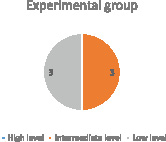
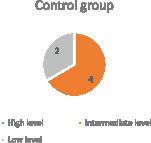
Fig. 1. The level of knowledge of children about the sights of the city (the ascertaining stage of the study)
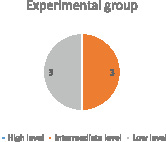
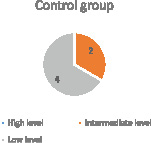
Fig. 2. Analysis of the results of an individual conversation at the ascertaining stage of the study
In the experimental group, 50 % had good knowledge and interest . Of the control group, 30 % (2 children – 002, 006) showed no interest in the conversation, with great difficulty answering the question. The rest of the children gave incomplete answers, lost interest, and were sometimes distracted during the conversation itself.
Method 2. Individual conversation with children on the topic “Victory Anniversary”. The diagnostic results are shown in (see Diagram 2).
According to this method, the high level was not shown in both groups, in the experimental group, the average level was shown by 50 % of children, in the control group, the average level is 30 % of children.
Method 3. Questionnaire survey of parents.
Purpose: to study the features of patriotic education of children in the family. 12 parents took part in the survey.
The results of the study are as follows, the answers are shown in the form of a diagram.
Parents consider the problem of patriotic education of preschoolers to be very urgent. Most parents believe that it is necessary to introduce preschool children to the symbols of the state, traditions, and sights. 70 % of parents said that patriotic education is love for the Motherland. Half of the parents would like to expand their children’s understanding of their native land, the capital and the sights of the city. Moreover, 100 % of parents agree that they should.
Research results and discussion of the results. At the formative stage of the study, we implemented a project on patriotic education of older preschool children. Purpose: Formation of ideas about the Great Patriotic War (education of patriotic feelings in preschool children) on the basis of existing ideas about the war, preservation of the continuity of generations, formation of preschool children’s respect for the military history of Russia, civil positions, education of patriotism and a sense of pride for their Homeland, fellow countrymen, relatives – war and labor veterans, war children.
Objectives of the project
1. Conduct a search work to collect material on memories and family archives about relatives, war veterans and home front of their native village (city) together with their parents.
2. Prepare an album or presentation.
3. To defend the report in the competition for the best project.
Table 1
Project program passport
|
Last name, first name, patronymic of the author |
Olga Stepanovna Okhlopkova |
|
The name of the educational institution |
“Micheer” MBDOU No. 89 “Parus” Yakutsk. |
|
Project type |
Search and Research |
|
The theme of the project |
“Winners through the eyes of grandchildren and great-grandchildren” |
|
The leading idea of an innovative project |
Introduce the history of the Motherland, the contribution of Yakutsk, relatives in case of Victory in great Patriotic war, preserve the family’s history during world war II, the memory of veterans of war, labour, participation in events for the 75th anniversary of the great Victory in the online format |
|
The subject areas within which the project is conducted. |
Artistic and aesthetic, educational. |
|
The age category for which the goals of the training project |
Senior group |
Table 2
The stages of the project
|
Preparatory course |
– project development; – setting goals and objectives; – definition of the main forms of work; – collection of information, literature, and additional materials; |
|
The main one |
– Implementation of project tasks |
|
Final report |
– Evaluation of the project effectiveness; – Project protection. |
The problem of the project: The modern generation knows little about the Great Patriotic War and the patriotic feeling does not arise by itself. This is the result of a long, purposeful educational impact on a person, starting from childhood. In this regard, the problem of moral and patriotic education of children becomes one of the most relevant, starting with the family, the history of the family during the Second World War. The heroes of the children’s reports can be great-grandfathers or other relatives, war veterans. Children know especially little about relatives who are no longer alive. It is necessary to restore the memory of them. There is no family that has not been affected by the war. You can prepare a material about the veterans of the home front, their work and help to the front in the rear. This year, the generation of “Children of War”, whose difficult childhood was spent during the war years, is officially recognized.
The intended result of the project
As a result of working together with parents, children will learn the biographies of their great-grandfathers and relatives, about their contribution to the Victory in the Great Patriotic War.
Results of work on the project
The organization of work on the project was carried out in a remote format. The main work was carried out with parents and children online, because the parents were also at home, they paid great attention to their children, were in close contact with the teacher and received tasks from him.
Consider the results of repeated diagnosis at the control stage of the study (see diagram. 3).
Analysis of the results of the control experiment showed that in the experimental group, the percentage of children with a high level increased, which is 50 % ; with an average level of representations, 30 % of children; the low level of representations remained only in 20 % compared to the ascertaining stage (50 %).
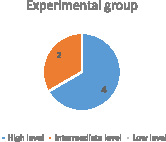
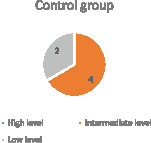
Fig. 3. Levels of development of patriotic ideas in older preschoolers at the control stage of the study
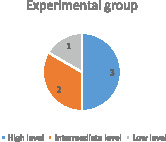
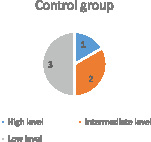
Fig. 4. Levels of children’s knowledge about the war (control stage of the study), (in %)
It can be concluded that the knowledge of the children of the experimental group about the war has significantly enriched.
The results of the control group did not change much, a high level was shown in one child of 20 %, 30 % – 2 children showed an average level and the rest-a low 50 % (3 people).
The obtained statistical data on the results of the study are presented in the diagram (see diagram 4).
The survey of parents showed that they consider the problem of patriotic education of preschoolers very relevant. 100 % of parents agree that it is advisable to introduce modern children to the family lineage, family history, the contribution of grandparents to the history of their native land, and the protection of the Motherland.
Summarizing the survey data, we can conclude that parents recognize the need to educate older preschoolers with a sense of love for their native land, familiarization with the traditions, history and culture of their native city.
Conclusion
Thus, the results of the experimental work showed positive results. Project activity is an effective means of patriotic education of children of senior preschool age.

